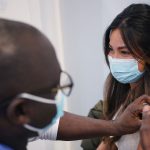Three shots of the Pfizer/BioNTech COVID-19 vaccine has been shown to generate a neutralising effect against the new Omicron variant in a laboratory test.
The vaccine manufacturers released their first joint statement regarding the likely efficacy of their shot against Omicron on Wednesday.
They claimed that two vaccine doses resulted in significantly lower neutralising antibodies, but that a third dose increased the neutralising antibodies by a factor of 25.
Follow COVID live updates from the UK and around the world
If needed, they can deliver a vaccine specifically for the Omicron strain by March 2022, they added.
The research found that blood obtained from people that had their third booster shot a month ago neutralised the Omicron variant about as effectively as blood after two doses fought off the original virus – which was first identified in China.
“Although two doses of the vaccine may still offer protection against severe disease caused by the Omicron strain, it’s clear from these preliminary data that protection is improved with a third dose of our vaccine,” said Pfizer chief executive Albert Bourla.
Man who stood in rain to see sick father for last time ‘devastated’ and ‘angry’ over Downing Street Christmas party
COVID-19: Boris Johnson minded to move to Plan B of rules this week, Sky News understands
COVID: Stereophonics gigs pushed back amid rising Omicron cases – as performers’ union calls for enforced masks
“Ensuring as many people as possible are fully vaccinated with the first two dose series and a booster remains the best course of action to prevent the spread of COVID-19.”
Omicron may be more infectious – but do we need to worry if it causes less severe disease?
BioNTech boss Ugur Sahin added that the latest data indicates that a third dose “could still offer a sufficient level of protection from disease of any severity caused by the Omicron variant”.
He continued: “Broad vaccination and booster campaigns around the world could help us to better protect people everywhere and to get through the winter season. We continue to work on an adapted vaccine which, we believe, will help to induce a high level of protection against Omicron-induced COVID-19 disease as well as a prolonged protection compared to the current vaccine.”
Omicron concerns
The Omicron strain was first detected in southern Africa last month, triggering alarms around the world of another surge in infections.
More than two dozen countries from Japan to the US have reported cases.
Last month, the World Health Organisation (WHO) classified Omicron as a “variant of concern,” but said there was no evidence to support the need for new vaccines specifically designed to tackle it, despite its many mutations.
The new strain also sparked fears that existing COVID-19 vaccines and treatment could be less effective against it.
The latest findings from Pfizer-BioNTech are broadly in line with a preliminary study published by researchers South Africa’s National Institute for Communicable Diseases this week, which suggested Omicron was able to evade some immunity, but existing vaccines should still protect against severe disease and death.
However, a lab analysis at the university hospital of Frankfurt, Germany, discovered a reduced antibody response to Omicron even after three doses.
What other vaccine manufacturers are saying
Moderna’s Stephane Bancel has warned that the current coronavirus vaccines are unlikely to be as effective against the Omicron variant as they were against the original strain.
The US company has said a new vaccine tailored for Omicron should be available by March next year.
Meanwhile, Johnson & Johnson said it was testing blood serum from participants in various trials to look for neutralising activity against Omicron, as well as pursuing a specific vaccine against the strain.
However, the company has remained confident in the immune responses generated by its shot against other variants to date in clinical studies.






















